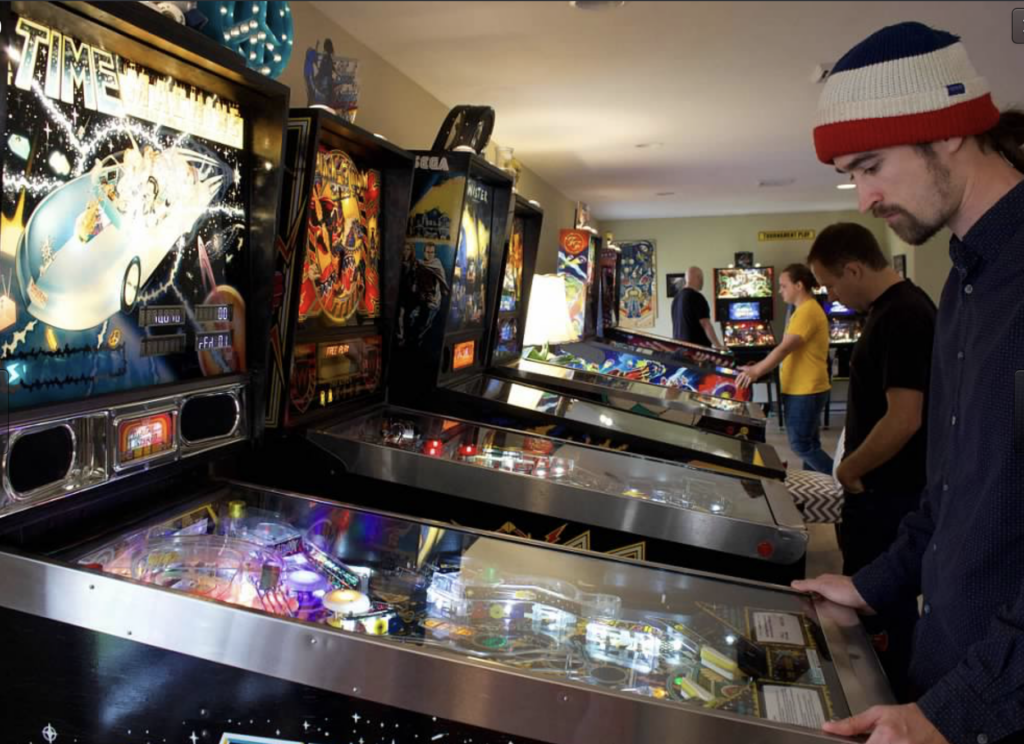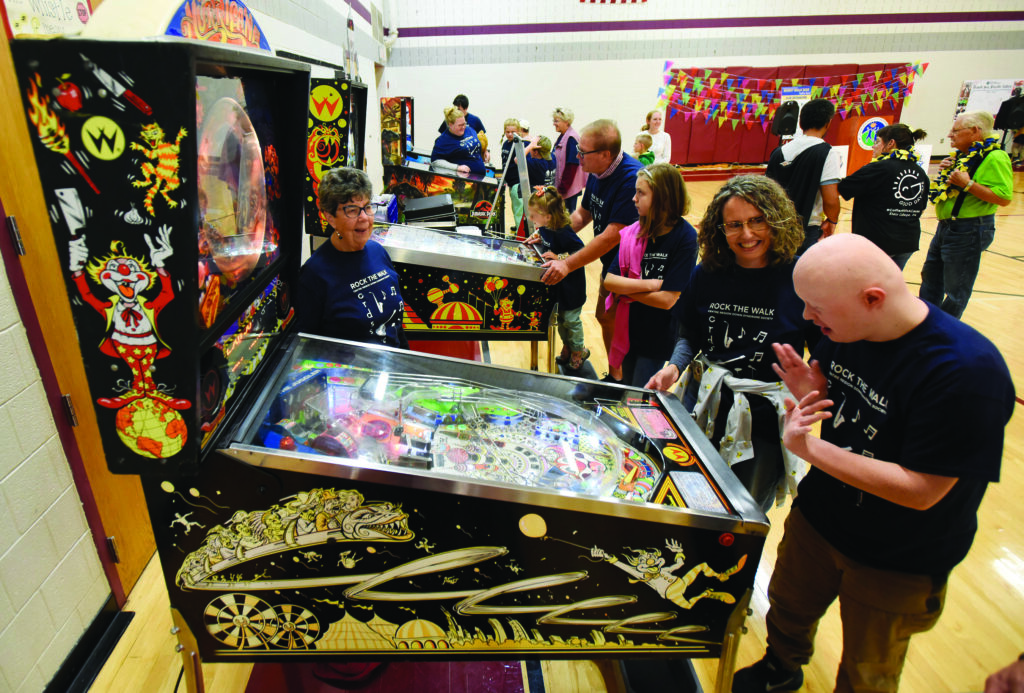Joe Schall calls himself a pinhead. But that doesn’t mean he’s a numskull. No, he’s a pinball enthusiast.
He found fun playing pinball as a graduate student at Penn State in the 1980s. It was the heyday of pinball, and there were machines in the HUB on campus and at the two arcades in downtown State College. “I got hooked on cheap entertainment, and I got to playing and got good at playing,” Schall says.
He has kept up the hobby, collecting machines, maintaining them, and promoting pinball at a time when video game consoles like the Xbox or PlayStation and online apps dominate the gaming world. He has recently begun hosting a tournament for fellow pinheads like himself called Silverball Sundays that he hopes is another way to expose new players to the hobby and rekindle the interest of those who have done it before.
“We are devoted to keeping pinball alive and well in Happy Valley,” Schall says. “People wonder if pinball machines are still being made. The group of us who are committed to the tournaments want people to know that it’s still out there available to play and enjoyable for kids of all ages.”
The Tournament
Yes, pinball machines are still being made, and Schall has two newer machines among the eight in the downstairs game room of his Bellefonte home, where he hosts the tournaments one Sunday each month. It’s a friendly competition—anyone of any skill level is invited to attend—and the entry fee is $6.
Schall says he decided to start up a new tournament at his house for a couple of reasons. The number of places to play pinball in State College isn’t what it used to be, and factors like lighting and space are important for players. He can control that at home, he says. He is also able to service the machines in case they need maintenance before tournament play starts.
The tournament is certified by the International Flipper Pinball Association, and players can earn points based on their results.
Players are split up randomly into groups and assigned randomly to machines. They get three plays per round to score as many points as they can. Points are awarded based on their placement in each round, and the player with the most points at the end of the tournament, which lasts three to four hours, wins the competition and a cash prize.
The results are shown on a big-screen TV through a match service Schall uses.
The Machines & the Game Play
The two newest pinball machines in Schall’s collection are music-themed. A Foo Fighters machine from 2023 brings the band’s concert experience to the pinball playfield with fifteen songs. The Rush machine from 2022 features sixteen songs by the rock band.
Three machines are themed around movies (Twister, Jurassic Park, and Star Wars) and show footage of the films as part of the game play.
Schall’s Time Machine pinball machine takes players through the decades as they complete objectives. His Black Knight 2000 machine is themed around the titular character.
The last one, World Cup Soccer, commemorates the first time the U.S. hosted World Cup soccer competition, in 1994.
Schall says players may spend just a few minutes playing a turn during a round. They’ll try to keep the pinball in play for as long as they can, aiming to activate the multiball phase. That is when the player successfully locks three balls on the playfield, and the machine releases another ball into play. The player can hit certain spots for larger jackpots and points.
For tournaments, Schall says he increases the difficulty settings on the machines to speed up game play and equalize everyone’s abilities.

The Pinheads
James Sumereau, 28, was one of the players at the November tournament. He met Schall when Schall was organizing pinball games in 2020 at Chronic Town in downtown State College. After Chronic Town closed in 2022, Sumereau started playing at the downtown Champs. He says he enjoys making connections with people while playing.
“Pinball is different enough from console games,” he says. “It’s a novelty, and there is a community aspect to it.”
He says he typically plays once a week. “I’ve definitely gotten better,” he says, joking that he’s “not good under pressure.”
Nick Fishter, 36, came to play from Lewistown. He took up pinball five years ago when he was living and working in Washington, D.C., where there is a strong pinball scene.
He has three machines at home—Godzilla, Deadpool, and Lord of the Rings. He’ll invite friends over to play, and it’s common for him to spend Saturdays cooking for the following week and playing pinball.
“If you ask anyone who has machines, you can’t have enough,” he says. “You can’t beat playing pinball.”
Fishter says he plays differently at home compared to playing in a tournament. At home, he’ll play to beat the machine, but in a competition, he says you want to maximize your points as much as you can because your time is limited.
Liz Helms, 44, was the lone female pinball flipper at the November tournament. She grew up playing pinball, having started when she was eight because her dad was an enthusiast. Now she’s an enthusiast, too, and she has even connected her dad with Schall for some maintenance issues that he did not know how to fix.
She remembers seeing a young girl playing at a different tournament who reminded her of herself.
“I was once that nine-year-old girl,” she says. “I was so proud of her.”
Nudging or Tilting
The opening round of the November tournament saw Schall in a group with Sumerau, Helms, and another player, Eric Pearson. They were assigned to the World Cup 94 machine, which shows players beating the countries in the tournament as they score more and more points.
Schall’s first turn ended early because he nudged the machine too much as he was trying to keep the ball in play and avoid losing it down the drain. (That’s the term for the place at the bottom of the playfield that’s out of reach of the flippers.)
“Nudging is a skill of the game,” Schall says. But this machine thought he nudged too much, scoring a tilt. The soccer-themed machine actually called it a yellow card, which is what referees give to players as warning for unsportsmanlike behavior.
Sumereau had the best showing on the first turn, but Schall came roaring back with his second chance.
Pearson passed Sumereau in points when he scored a penalty pinball. He managed to have the ball stop in a spot on the playfield in front of a net with a moving goalkeeper. All he had to do was flick the flipper to launch the pinball at that keeper and go in the back of the net to score. He did it.
“Blink, and you miss it,” Sumereau commented to Schall about the quick moving nature of the game.
In the next round, Schall was assigned to the Black Knight 2000 machine. Fishter triggered the multiball phase, which gave him the chance to hit new jackpots and score more points.
He was careful handling the machine.
“Now is not the time to tilt,” Fishter says.
The Local Pinball Scene
Aside from the pinball machine at Champs in downtown State College, there are a few local spots where enthusiasts can play.
Brothers Pizza in the Hamilton Plaza, State College, has one machine. The Chill Out Hookah Lounge on West College Avenue has two, and the Milesburg Travel Center has two as well.

Schall also brings the machines to activities held by local organizations to give more people a chance to enjoy pinball as he does. For example, he took them to the Centre Region Down Syndrome Society’s 3-21 Celebration Dance in March 2023 and its Buddy Walk in October. He says he is struck by how his pinball outreach touches the hearts of those individuals with special needs and the staff or volunteers of the organizations who may be playing pinball for the first time in a while.
Tips & Tricks
Schall and his fellow pinheads give advice for anyone who may be interested in giving pinball a try for the first time or taking up the hobby again.
- Don’t be intimidated by the fast-moving nature of the game. Beginners can have good luck, and long-time players can have a bad game.
- Scan the playfield to see what things are lit up. “Hit what’s lit,” Schall says, “because that will always be worth points and will work toward a goal,” such as having the machine reward you with the multiball phase.
- Slow things down. Hand-eye coordination is key. “You want to play control instead of firing the ball and hitting everything,” Schall says. “Get control of the ball by holding it in the flipper.” The machine’s screen will also give instructions, so be sure to look up once you have control of the ball.
- Learn to predict where the ball is going. Sumereau says it takes practice to be able to do this, and that is something that helped him improve. “I didn’t think you could be good. I learned all these techniques.”
- Pearson says there’s a story to the play. “It’s a story once you figure it all out,” he says. “Once you push through the initial period of learning what it’s all about, you really get hooked.”
For more information about the Silverball Sundays tournament, visit Schall’s website at jschall99.wixsite.com/silverballsundays. T&G
Mike Dawson is a freelance writer who lives in College Township.



